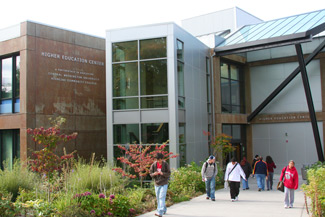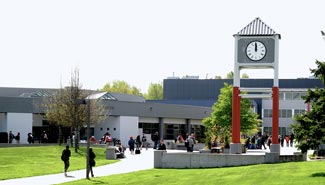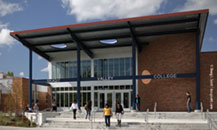
Find Hospitality and Tourism programs
Travel and tourism is the world’s largest industry. International hospitality management involves working with so many people and cultural layers that it has the power to help shape international relations—and change the world.
For you, this translates to a wonderful opportunity for a wide variety of exciting career selections. If hospitality and tourism is your chosen career, choosing to study in the United States could be one of the best things you do for yourself. Here’s why ...
A Model for Global Industry
Students from around the world come to this international hub of business and hospitality to learn and experience firsthand what customers want, need and are going to demand in today’s global economy. With the quality of customer service increasing, the hospitality industry has become highly competitive, and you’ll need that professional edge to get your foot in the door. In the USA, hospitality training focuses on preparing students to become managers, rather than staff employees. Therefore, creative thinking and leadership are emphasized throughout the curriculum of American education.
Culture
It may surprise you that by living and studying in the USA you’ll increase your knowledge not only of American culture but other foreign cultures as well. The USA is truly a melting pot. We come from many different backgrounds and this is reflected in our everyday living. Experiencing a diverse set of cultures is especially advantageous for those in the hospitality industry as the clientele is not isolated to one country.
Enhanced English Language Skills
By actually living in the United States you will be immersed with English speakers. Classes at most schools are taught in the English language by native speakers. Your speaking skills, vocabulary, idiomatic usage, comprehension, and listening skills will all be enhanced. What’s more, since English continues to be one of the major languages in global business, immersion in the language can be critical for success, and understanding the culture is an added benefit.
Flexibility
It is not unusual to change your major or pursue more than one program simultaneously at an American university. Additionally, students often transfer from one educational institution to another. For example, as you progress in your studies at one school, learning more about the hospitality industry, you may discover a specific area of hospitality you want to pursue. This may motivate you to transfer to a different school that specializes in that area, or that is located near hotels and businesses offering internships that would be strategic to your career goals. With so many opportunities, there is sure to be something for you as you study abroad.
Wide Choice of Programs
In the past 30 years, the number of U.S. higher education institutions offering hospitality, travel, and tourism programs has more than quadrupled. This has resulted in a wide variety of philosophies and approaches. Guest service is the common thread woven through all programs. While not all programs are available at every school, generally there are certain areas you may want to study: lodging, recreation, travel, tourism, convention, culinary, food, and beverage, or casino.
As an international student, you will find that the American education system offers instruction in a broad range of subjects. Most likely you will take classes that fall into the liberal arts category, as well as courses specific to your program, such as Hotel and Restaurant Accounting, Resort Management, or Ecotourism.
The University of California, Irvine (UCI) offers a three-month International Tourism & Hotel Management Certificate focusing on the growth of environmental consciousness within tourism. Using case studies, instructors help students grasp concepts and practices of successful hotel management that emphasize sustainability and conserving natural resources. Throughout the program, the students examine real-life cases that involve tourism infrastructure, superstructure (for example, developing a new airport), and issues relating to pollution. They then determine how a tourism project will affect the local economy and the environment.
Instructors tailor the assignment to each student’s country or city of origin, teaching students from overseas to learn to identify how some tourism issues relate to their home countries and the possible solutions they can apply. They then give a class presentation about their findings.
Project management and customer service skills are important aspects of the program. For instance, the Customer Service class covers a variety of topics: delivering better, faster service, increasing customer satisfaction, learning how to gain repeat business, finding workable solutions to customer problems, and motivating employees.
The Marketing and Branding class covers such timely topics as electronic resources, international competitive analyses, and metrics for evaluation.
PROFESSORS
Faculty members come from a diverse set of professional backgrounds. While qualifications may differ, generally speaking, faculty members have at least a master’s degree and extensive experience in the hospitality industry. They are dedicated, hard-working, and genuinely care for their students.
EMPLOYMENT EXPERIENCE
Many hospitality programs offer intensive training, cover a variety of subjects, and provide a special emphasis on customer service—something that many students find to be an invaluable part of their training. Credentials or a degree from an American university are respected all over the world and most importantly, many graduates find great success and mobility in their careers.
Through internships/work experience programs, you gain invaluable practical experience in your chosen field. Internships are an ideal way for you to develop your customer service skills and learn to handle unique situations. The best programs integrate both academic site visits and trips to local attractions into the curriculum. Along with learning the business aspects of hospitality management, you will gain the perspective of your future customers.
LASTING FRIENDSHIPS
Last, but certainly not least, is the opportunity you will have to make lifelong friendships. The other students you will meet and the friends you will make, will in many cases, be in your life long after you complete your studies.
Thanks to the diversity and variety of excellent programs like these, hospitality graduates from U.S. schools are working in the hotel and restaurant industry in nearly every country of the world.
We are confident this will be the experience of a lifetime!
Delaware County Community College
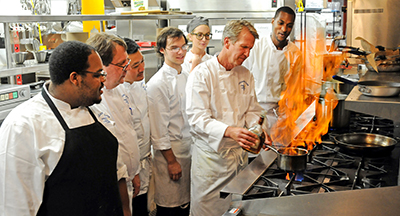
Just 30 minutes from Philadelphia, Delaware County Community College gives hospitality students the opportunity to intern, and later work, in a variety of renowned hotels, restaurants, casinos, country clubs and more.
Led by expert faculty who have worked in the field, the College’s two-year Hotel and Restaurant Management associate degree provides a strong foundation for students interested in an exciting, rewarding career in hospitality. Students are taught the supervisory skills needed to operate a hotel, bed and breakfast, inn and restaurant. They learn vital industry skills in human resource management, marketing and sales techniques. In addition, they become certified in food handling sanitation through ServSafe, an important U.S. food safety certification.
Students have opportunities to pursue internships to discover what the field is like and to gain hands-on experience. In the past, students have interned at a number of renowned organizations, including Walt Disney World, the Philadelphia Hotel Association, Wawa, Wegmans, Longwood Gardens and many Philadelphia-area hotels and restaurants.
After completing the program, students can begin their career or transfer to a four-year university to pursue a bachelor’s degree. A range of organizations have hired Delaware County Community College graduates, including Hilton Garden Inn, Hotel DuPont, Aramark, Springhaven Country Club and more. Many four-year colleges and universities in Philadelphia offer hotel and restaurant management programs and the College provides advising to help students with the transfer process. Students often transfer to Drexel University, Temple University’s School of Sport, Tourism and Hospitality Management and Widener University.
Highline College
International students can also enter this field through community college programs such as the Hospitality & Tourism Management program at Highline College in Des Moines, south of Seattle in Washington State. Highline provides an education focused on front office, food and beverage, housekeeping operations and management in a hotel, and also features an in-depth internship.
Faculty come from a wide variety of professional backgrounds. While qualifications may differ, generally speaking, faculty members have at least a master’s degree and extensive experience in the industry. They are dedicated, hard-working and genuinely care for their students.
Kirkwood Community College
Kirkwood Community College’s Hotel Management program is delivered within the onsite seventy-one room full service hotel property, The Hotel at Kirkwood. The hotel is a AAA Four Diamond rated property designed to provide students with hotel operations experience and extensive real-time training.
The Associate of Applied Science (AAS) Degree program uniquely affords students with opportunities to receive instruction and career development from the experienced faculty within the Hospitality Arts department and also from the senior leadership team of The Hotel at Kirkwood: General Manager, Director of Sales, Director of Food and Beverage, Front Office Manager, Executive Housekeeper and other leaders. Students are taught how to run a successfully functioning hotel property.
“Not a lot of schools put you face-to-face with real life guests and real life situations so I think that this program really sets itself apart from other programs,” explains hospitality alumnus, Jared Alberts.
Graduates of the Hotel Management program are positioned to either enter the job market at the supervisory level as Assistant Front Office Managers, Sales Coordinators, Banquet Captains, Housekeeping Supervisors, or Restaurant Supervisors, or to further their education by transferring Kirkwood credits to a number of local, regional, or national accredited universities in the pursuit of baccalaureate degrees in Hospitality Management.
Bachelor’s of Applied Science in Hospitality Management
South Seattle College
South Seattle College’s Bachelor’s of Applied Science (BAS) in Hospitality Management program offers courses in Service Operation Management, Hospitality Marketing, Entrepreneurship, Human Resources, and many more. Located in beautiful West Seattle, it is the longest running and most established BAS program in Washington State. The program has a distinguished, active Board of Technical Advisors representing all major hospitality players in the area including Four Seasons, Microsoft, Starbucks, Alaska Airlines, and Holland America. The Board members offer their expertise and mentorship to the Hospitality students. They are also on the lookout for talent and dedication, and often hire from the graduating class. The program has an unmatched graduation rate, and nearly 100 percent job placement.
The close connection between the Hospitality Management Program and industry partners, in one of the fastest growing cities in the U.S., ensures both rigorous academic standards and current industry relevant curriculum content. The BAS faculty and staff facilitate connections between the students and industry leaders either through field trips and site tours, class visits and lectures by senior professionals, or individual connections.
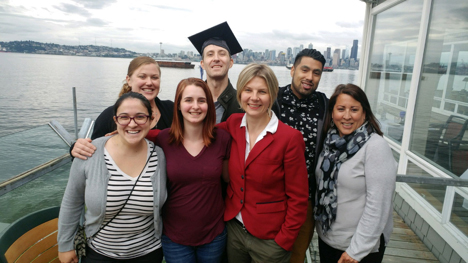
BAS students, Class of 2017
“The most rewarding part of my job is helping students find their passion and connecting them with the right employer,” says Hana Kabele Gala, Phd. a member of the Hospitality Management Faculty at South Seattle College.
Many students participate in the paid internship program at the Four Seasons Resort in Jackson Hole, Wyoming, or learn about event planning or Food and Beverage management on the Microsoft campus nearby. International students are eligible to apply for Curricular Practical Training (CPT) after completing three consecutive quarters of their academic study and Optional Practical Training (OPT) which allows students to work in the U.S. for one year after they graduate.
Starting in January 2018, South Seattle College will be also offering an online six month certificate in On Site Dining Management in partnership with America’s largest on site foodservice operators such as Aramark, Sodexo, Compass Group USA, or Mars drinks.
Skagit Valley College
At Skagit Valley College in Mount Vernon, Washington, farm-to-table isn’t just a philosophy, it’s a practice. Students in the Culinary Arts and Hospitality Management program plant and maintain gardens that produce fruits and vegetables for daily meals in the campus’ Bistro Kitchen and Hot Express.
“We are passionate about growing our own produce,” says Lyn Highet, the college’s Food Services Manager.
Founded in 1978, the program has diversified to incorporate agriculture and sustainable food systems and practices such as composting—Skagit was the first college to start a composting program. Skagit is also developing culinary artisan programs as Washington State boasts many nationally recognized artisan cheesemakers, charcutiers and brewers.
Students in the program master the culinary fundamentals and techniques such as making stocks from scratch for daily soups and grinding meat for hamburgers.
The area around Skagit Valley College is fertile and agriculturally rich, lending it to many farmers, of both land and sea, and culinary artisans. Students take fieldtrips to meet producers like the farmers at Taylor Shellfish Farms, the largest producer of Manila clams in the USA.
Students who complete the Culinary Arts and Hospitality Management program earn an Associate and Technical Arts degree. Many students either begin their careers or move on to advanced culinary programs.
By Kelly Oto
Assistant Director of Professional Programs, English & Certificates for Internationals at the University of California, Irvine.

